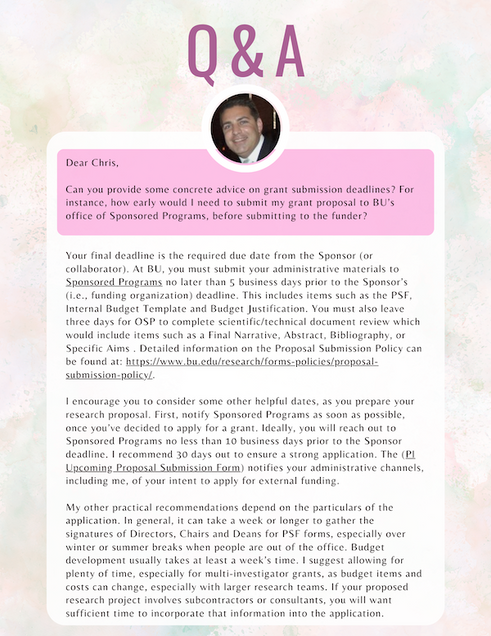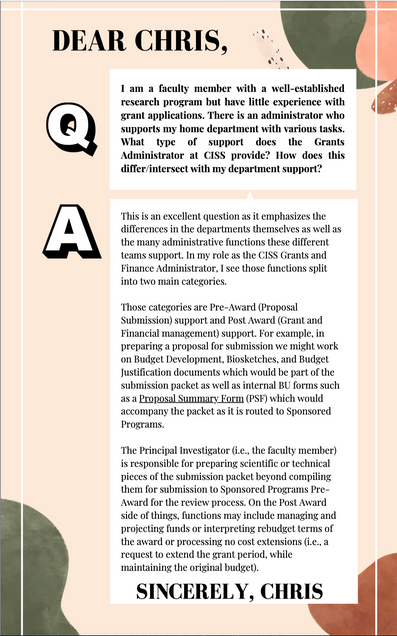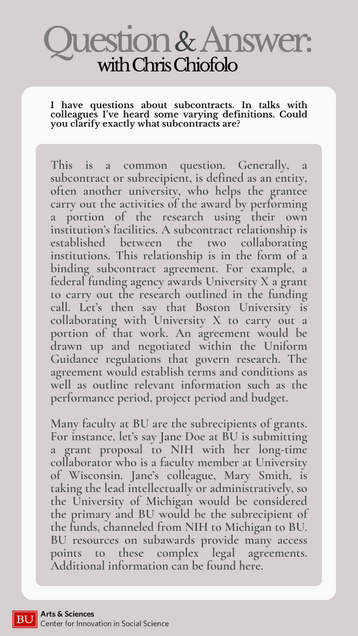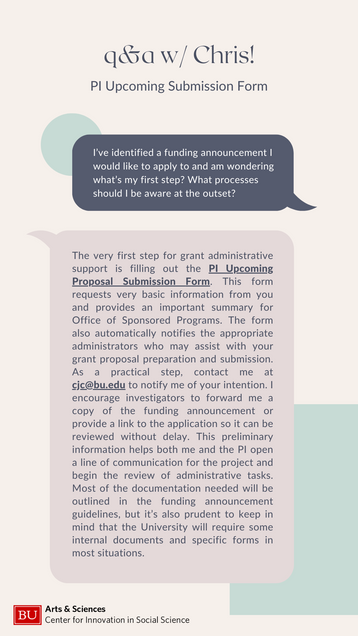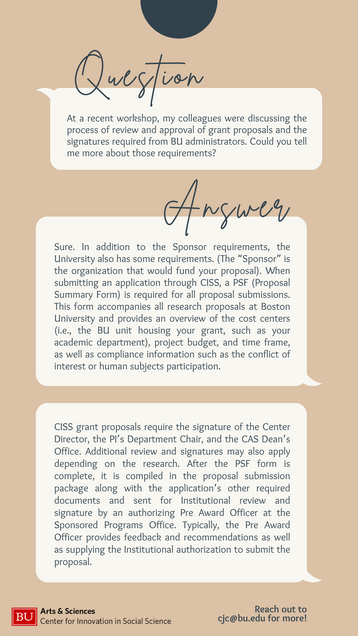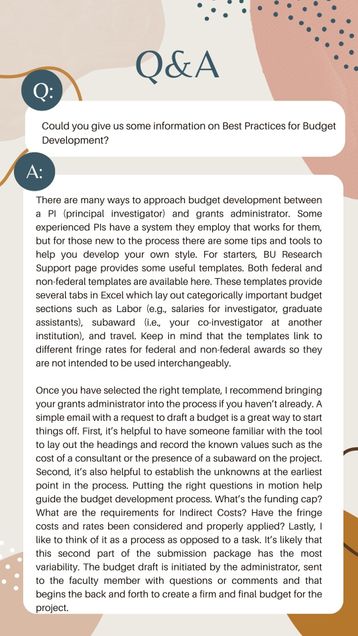Below is an archive of grant related questions shared in the CISS Weekly Digest. If you do not find your question below the CISS grants administrator, Chris Chiofolo, is happy to answer your question/s regarding grant applications and funding. Please send it to cjc@bu.edu. Answers to your questions will appear anonymously in a future Weekly Digest and be posted on this page shortly afterward.
Proposal Submission
Dear Chris, Why So Many Budget Templates?
Dear Chris,
I’m preparing a grant proposal and have noticed that both my institution and the sponsor require budget templates in different formats and requirements. Why is this the case, and does using Boston University’s template help?
Dear Applicant,
The budget process can feel like a maze of forms and requirements. While it might seem redundant or unnecessarily complex, there are good reasons why both Boston University and your sponsor require their own budget templates.
BU has its own set of administrative, compliance, and financial tracking requirements. Their template is designed to:
- Ensure all institutional policies (including fringe benefits, indirect costs, and salary caps) are applied consistently.
- Help the research administration team review the budget efficiently and accurately.
- Integrate your proposal smoothly with internal accounting and record-keeping systems for both current management and historical archiving.
Each funding sponsor, whether a federal agency, foundation, industry, or even another university? has their own rules, categories, and priorities. Their template ensures:
- Applicants present budgets in a format that aligns with the sponsor’s review and funding processes.
- Compliance with sponsor-specific limitations or requirements (e.g., maximum allowable costs, specific cost categories, cost-sharing expectations).
- Simplified comparison across proposals submitted by many institutions.
Boston University’s budget template isn’t just a hoop to jump through. It’s a powerful budget development tool designed to help you build an accurate, compliant, and comprehensive budget before you move on to the sponsor’s form. By starting with the BU template, you can:
- Calculate all components of your project budget, including fringe benefits and indirect costs, according to the latest institutional rates.
- Create multiple versions of your project budget to arrive at the most efficient by allocating funds according different cost scenarios.
- Take advantage of the auto-calculating features in fringe and indirect cost application
Note also that budget templates from both sources are subject to change. It can be frustrating when a template you just mastered is suddenly updated. However, these updates serve important functions:
- Reflect updated rates: Fringe benefit and indirect cost rates may change annually. Templates must be updated to ensure budgets reflect the correct rates for the period of the proposal.
- Adapt to policy changes: Changes in federal, state, or institutional policies may require new data fields or budget justifications.
- Improve clarity and compliance: Feedback from users and auditors often leads to template improvements that make them easier to use or more compliant with regulations.
While managing multiple budget templates can be challenging, each serves a critical and distinct purpose. By using Boston University’s template as your starting point, you ensure your budget is thorough, institutionally compliant, and ready to be translated into the sponsor’s format.
Dear Chris, The NIH biosketch rules often change. Can you suggest some best practices for ensuring our biosketches are up to date?
Dear Chris, I am a postdoctoral associate at BU and would like to apply for an external grant. Are there particular rules I should know about? Please provide some information on Post Docs applying for grants?
Dear Chris, Can you describe the division of labor when preparing a grant proposal? For instance, what do investigators do, and what tasks are carried out by you and your team in Sponsored Programs?
Dear Chris, Can you provide some concrete advice on grant submission deadlines. For instance, how early would I need to submit my grant proposal to BU’s office of Sponsored Programs, before submitting to the funder?
I am a faculty member with a well-established research program, but I have little experience with grant applications. There is an administrator who supports my home department with various tasks. What type of support does the Grants Administrator at CISS provide? How does this differ/intersect with my department support?
I have questions about subcontracts. In talks with colleagues I've heard some varying definitions. Could you clarify exactly what subcontracts are?
I've identified a funding announcement I would like to apply to and am wondering what's my first step? What processes should I be aware of at the outset?
At a recent workshop, my colleagues were discussing the process of review and approval of grant proposals and the signatures required from BU administration. Could you tell me more about those requirements?
I'm new to proposal submission. The funding call notes that the PI is required to submit in the Sponsor's online portal. Do I still need to submit through Sponsored Programs?
I am required to include a Facilities and Other Resources page as part of my grant proposal. What is it, and what should I include in my description?
Budget Questions
Could you give us some information on best practices for budget development?
Could you help me understand the complicated BU Budget Templates?



